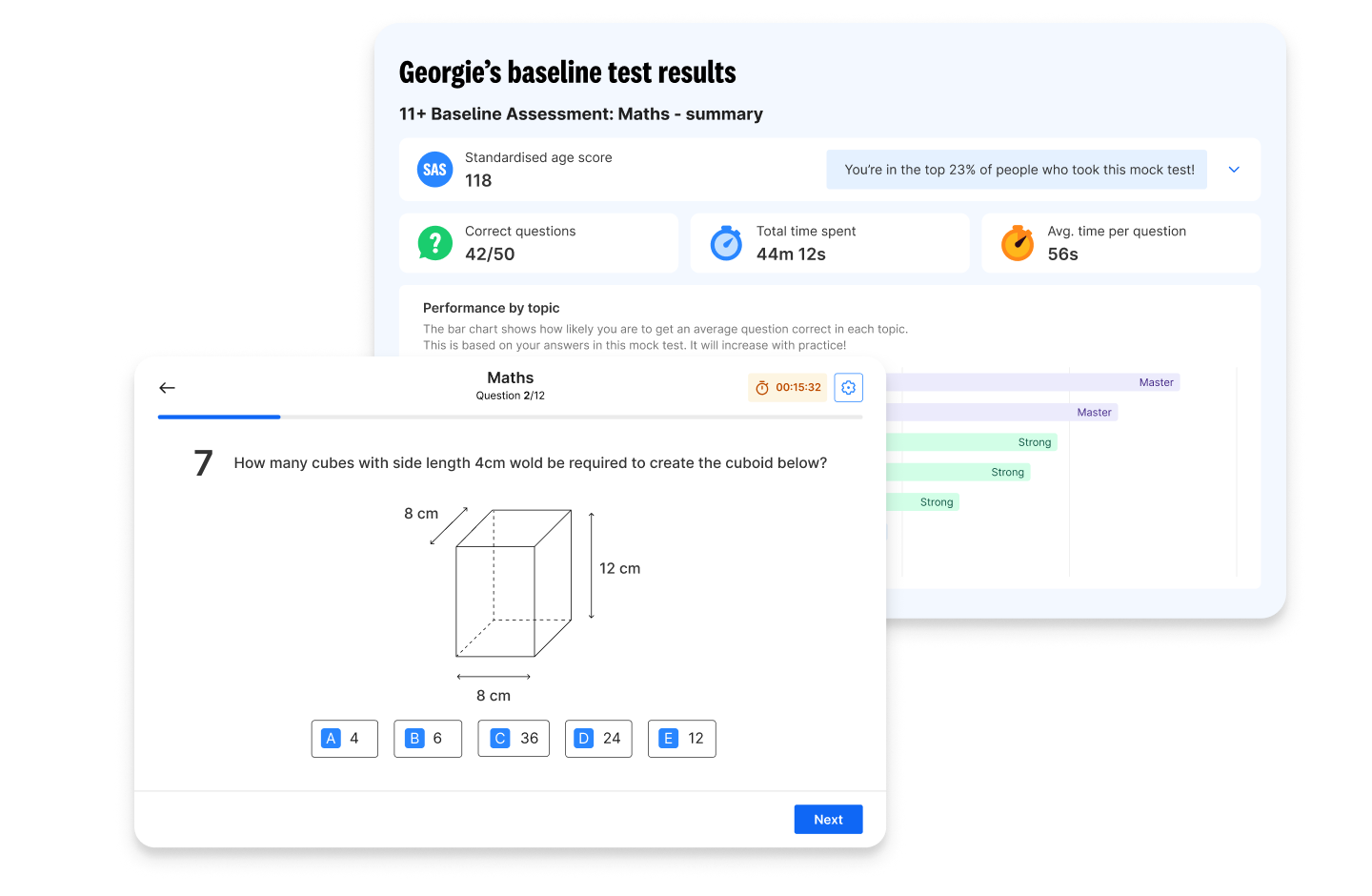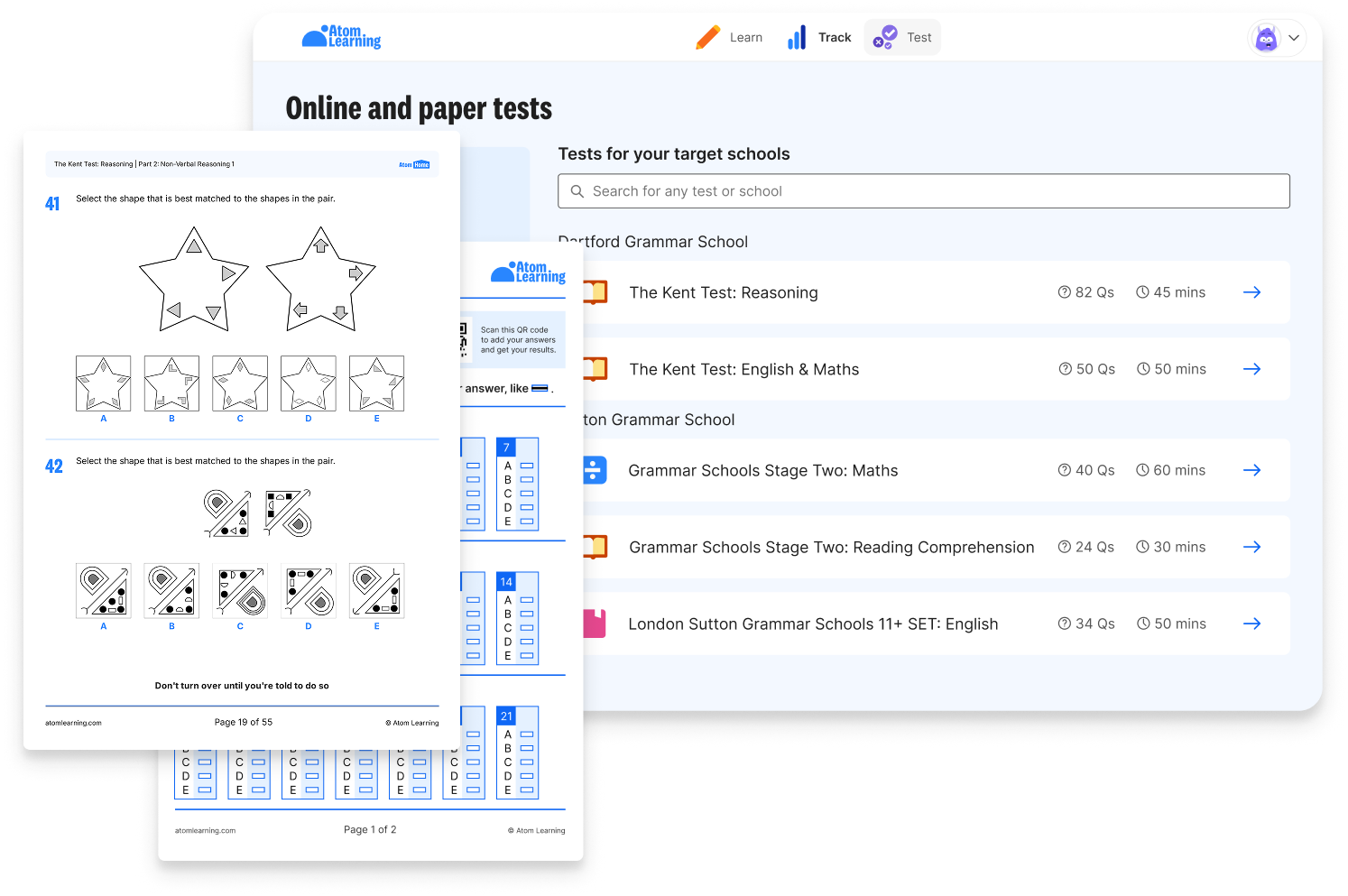11 plus challenging topics: English

In this series of free webinars, Atom’s Education Experts outline the areas of each 11 plus subject that our students struggle with the most, and share tips and techniques on how to prepare. Watch here, or keep reading for an overview:
The 11 plus English curriculum
The English 11 plus exam curriculum is mapped to the Key Stage 2 national curriculum which is taught at school in Year 5 and 6. CEM and GL Assessments grammar school exams cover both Year 5 and Year 6 topics, whereas ISEB focuses on Year 5 topics.
Curriculum overview:
Spelling
- Building words: prefixes, suffixes, compound words, plurals
- Word sounds: silent letters, letter strings
Vocabulary
- Meaning of words: definitions, antonyms and synonyms, homonyms, homographs and homophones
- Adaptation of words: words from abroad, diminutive and gendered words, abbreviations, figures of speech
Grammar
- Parts of speech: nouns, verbs, pronouns, adjectives and adverbs, prepositions, determiners, conjunctions, modal verbs
- Verb agreement: subjects and objects, person: subject/verb agreement, tenses: progressive and perfect, active and passive voice, subjunctive verb forms, tenses: simple past, present and future
Punctuation
- Commas, sentence enders, apostrophes, direct and reported speech, hyphens and parentheses, colons and semicolons
Comprehension
- Interpreting text: literal, deduction, inference
- Genre: persuasive writing, poetry, fiction, non-fiction, drama
- Analysing text: vocabulary and summaries, literary devices
Is your child ready for the 11+?
See where they stand in minutes. Atom’s free 11+ baseline tests give you an instant breakdown of their strengths and gaps. Know exactly what to focus on next and start preparing with direction, not uncertainty.

The 3 hardest English topics on the 11 plus
Our data shows that the three subtopics which Atom students struggle with the most are:
- Prepositions (grammar)
- Direct and reported speech (punctuation)
- Inference (comprehension)
Prepositions
Prepositions are words that connect a noun or a noun phrase to other words in the sentence. They often describe relationships of time and place.
Examples of prepositions: in, among, during, before, according to.
It can be quite tricky to identify prepositions because they can be similar to adverbs and conjunctions. The key thing to remember is that a preposition is always followed by a noun, pronoun, or noun phrase.
While it’s unlikely that your child will be asked to identify a preposition in their exam, being able to recognise prepositions is important to help build a strong understanding of grammar.
Direct speech
Direct speech is when the exact words spoken by someone are written down. A reporting clause can be added to direct speech to show who is speaking and how they are speaking.
Example of direct speech:
“Let’s go!” he cried.
“But if we go now,” Joy said, “we’ll miss the fireworks!”
It’s important for your child to understand how direct speech should be punctuated, as this often comes up in ‘spot the mistake’ style questions. Accurate punctuation of direct speech will also be marked as part of the creative writing task, if their exam includes one.
Punctuation rules to remember:
- Direct speech should be within inverted commas.
- Everything within inverted commas should end with a punctuation mark. This should either be a normal sentence ender like an exclamation mark or a full stop, or, if there is a reporting clause, a comma should be used
- Direct speech should be written on a new line whenever there is a new speaker.
Inference
Comprehension makes up a large proportion of 11 plus English exams, and inference can prove a difficult skill to master for students up to GCSE level. Inference is the skill of forming an opinion based on evidence and wider knowledge – the ability to read between the lines. This is quite different to other comprehension question types which require your child to retrieve information directly from the text.
Examples of inference questions:
- Why do you think the writer describes the cat as ‘a vicious furball’?
- What does the phrase ‘teeth gritted in determination’ suggest about Kwame’s attitude towards work?
Top tips for preparing for comprehension exams:
- Make sure your child is familiar with the keywords commonly used in these questions (e.g. compare, contrast, deduce, infer, suggest, atmosphere, purpose impression).
- Practice skimming, scanning and summarising texts.
- Encourage them to read widely for fun (especially guided reading, where you ask your child questions about what they have read).
- Practice creative writing. Ask your child to write their own inferences for different emotions (e.g. write about a character who is angry, without simply saying ‘they are angry’). This will help them to get into the mindset of an author and truly understand how texts can suggest information.
Find more reading comprehension resources here.
Watch the webinar for free for more ways to support your child with these English topics, plus exam techniques that will prepare them to take even the trickiest questions in their stride!
More challenging 11 plus topics
Take control of your child’s 11+ preparation.

Not sure if your child is on track for the grammar school 11+? You don’t need to guess what to cover or whether they’re ready. Atom shows you exactly what to practise each week and how they’re performing, so you can stay ahead of the process without the stress.
- Follow personalised weekly exam plans that show them what to learn next.
- Download replica 11+ practice papers and upload a photo for instant, stress-free marking.
- Track progress and see how they compare to others applying to the same schools.
Start your free trial and help your child feel fully prepared for the 11+.
